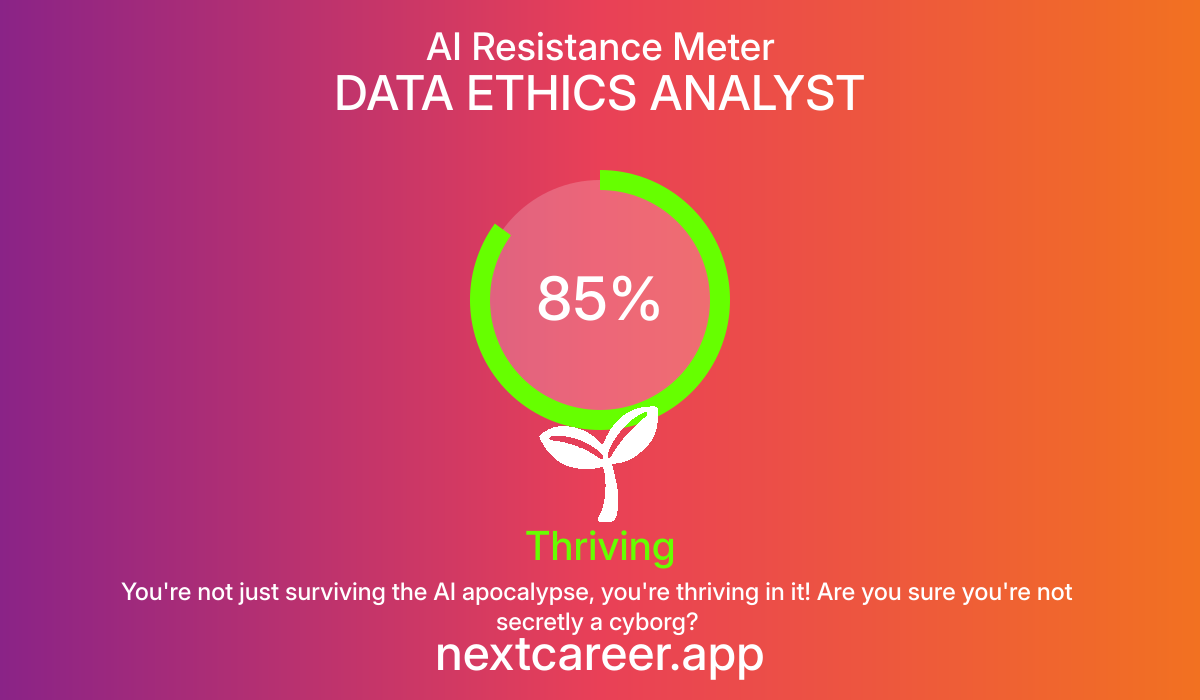AI Resistance Analysis
DATA ETHICS ANALYST
DATA ETHICS ANALYST
AI Resistance Score
AI Resistance Meter
Thriving
DATA ETHICS ANALYST
You're not just surviving the AI apocalypse, you're thriving in it! Are you sure you're not secretly a cyborg?
Data Ethics Analysts primarily focus on ensuring that data use aligns with ethical standards and regulatory requirements. This role involves a high level of cognitive tasks in evaluating ethical implications and making judgement calls that require a deep understanding of human values, societal impacts, and regulations. While AI can assist in data management and monitoring for compliance, the nuanced ethical considerations involved in data usage, especially as technologies evolve and new societal challenges arise, will likely protect this role over time. Moreover, the need for emotional intelligence in discussing these issues with stakeholders further cements its resistance to full automation.
Data Ethics Analysts primarily focus on ensuring that data use aligns with ethical standards and regulatory requirements. This role involves a high level of cognitive tasks in evaluating ethical implications and making judgement calls that require a deep understanding of human values, societal impacts, and regulations. While AI can assist in data management and monitoring for compliance, the nuanced ethical considerations involved in data usage, especially as technologies evolve and new societal challenges arise, will likely protect this role over time. Moreover, the need for emotional intelligence in discussing these issues with stakeholders further cements its resistance to full automation.
Key Factors
- Cognitive Tasks: The role requires critical thinking and analysis of complex ethical dilemmas which are not easily automated.
- Emotional Intelligence: The ability to assess and discuss sensitive issues with empathy is crucial and cannot be replaced by AI.
- Physical Skills: This role is minimally reliant on physical tasks, as it primarily involves analysis and communication.
- Creative Thinking: Formulating innovative ethical guidelines and frameworks requires creativity and forward-thinking.
Human Advantages
- Strong ethical reasoning grounded in human values and cultural contexts.
- Ability to adapt ethical frameworks as technology and societal standards evolve.
- Interpersonal skills to navigate complex stakeholder discussions and conflicts regarding data use.
AI Vulnerabilities
- AI-assisted analysis could handle basic compliance checks but lacks depth in ethical reasoning and judgment.
- Automated tools may misinterpret nuances in ethical debates that require human insight.
Recommended Actions
- Engage in continuous education on emerging technologies and their ethical implications.
- Develop strong communication skills to negotiate and advocate for ethical data practices with diverse stakeholders.
- Collaborate with tech developers to create ethical guidelines that are practical and enforceable in technological applications.
In the near term (5 years), AI tools will likely enhance the analytical capacity of Data Ethics Analysts by providing insights into compliance trends and potential ethical breaches. However, the role will expand to include proactive engagement with emerging technologies, like AI governance frameworks and privacy-enhancing technologies. In the long term (20+ years), as technology continues to evolve, the importance of ethical considerations will likely increase, leading to greater demand for ethical oversight across all data-centric roles. The focus on ethical AI and responsible data use will likely create new areas of specialization, requiring adapted skills in ethics, policy-making, and technology.

Why Calculate AI Resistance?
Understanding how AI-resistant your career is becoming increasingly important in today's rapidly evolving job market. Our analysis combines multiple factors including required human skills, technological adaptability, and future industry projections to give you a comprehensive view of your career's sustainability.